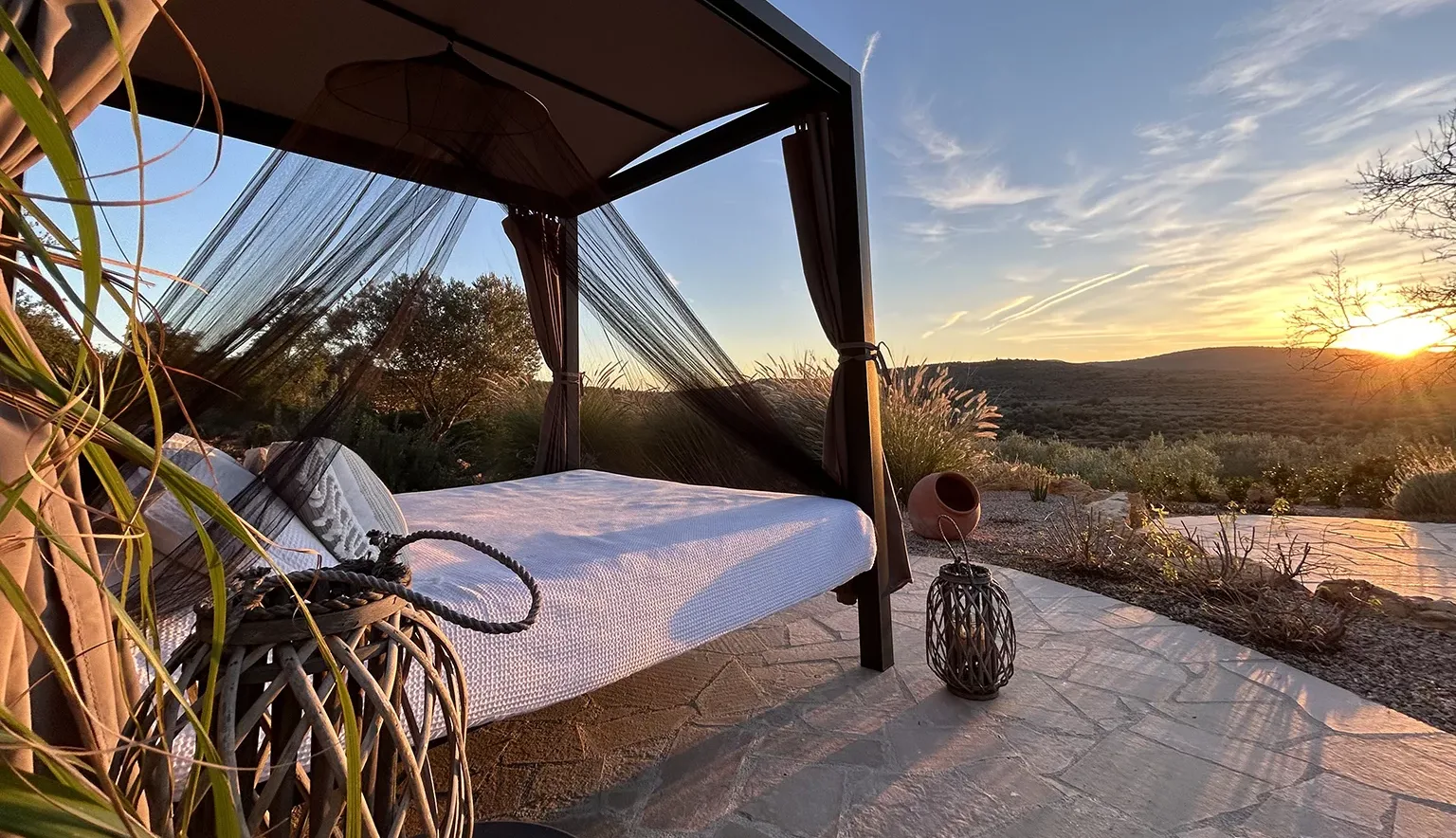Perched on a hillside in rural Spain, visitors can enjoy the serene surroundings of Casa de Olivos. Co-Founders, Claire Bretten and Ed Deane speak about its ecotourism accommodation transformation.
To experience total escapism from the everyday grind, travellers follow a less-worn path to the Spanish region of Maestrat. With its rolling hills overlooking Castellon Province, facing the little town of Traiguera and flanked by almond and olive groves, sits Casa de Olivos. This is authentic rural Spain, far away from the tourist hotspots of the crowded Costas.
“We are not classified as coastal, although the Costa Azahar (Orange Blossom coast) is only 15 minutes away by car. Casa de Olivos sits neatly on the border between the Spanish shore and the country’s interior, giving guests easy access to beaches, villages, and the landscape of the Maestrat, which includes extensive natural parks, forests, and mountains,” introduces Claire Bretten, co-Founder of Casa de Olivos.
The accommodation has enough space to house up to six guests across two fully furnished, self-catering apartments, each with a unique style, blending Mediterranean and British influences.
“We don’t have any neighbouring properties overlooking, so there’s always a sense of privacy,” adds fellow co-Founder, Ed Deane.
Focusing on reservations for ages 12 and above, Casa de Olivos welcomes families, groups, and couples, and whilst some guests book with sustainability in mind, they all seek off-grid relaxation.
“Our position midway between Barcelona and Valencia makes us ideal for city-hopping travellers who need a few days to chill. Casa de Olivos is the perfect antidote to the hectic pace and bustle of these two iconic Spanish cities. We have a soft spot for Valencia already, and now, as the EU Green Capital for 2024, we feel a particular synergy with this beautiful place,” Bretten divulges.
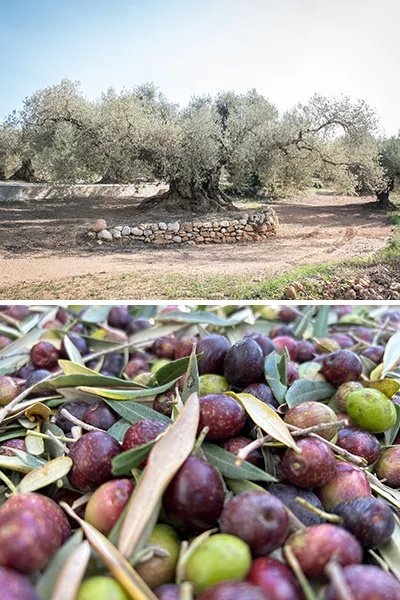
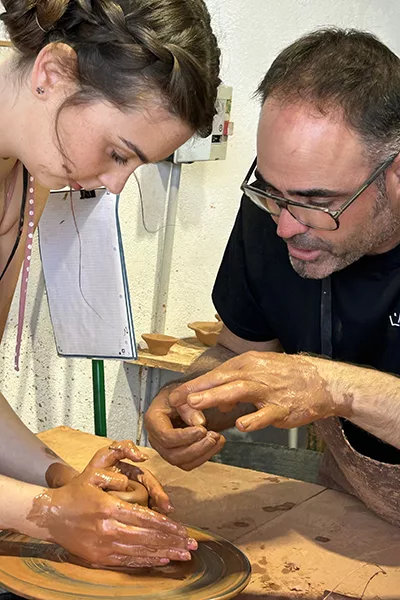
OLIVE ACTIVITIES
Casa de Olivos is in the heart of Castellon’s olive oil country, and with ever-present olive trees dating back thousands of years, the industry is of great importance to the town. Therefore, focusing on olives as an experience is a natural step for the business.
Traiguera is home to many millenary olive trees, which are still producing small fruits to this day. In particular, the Sinfo olive, estimated to be around 2,000 years old, is widely regarded as one of the best examples of these monumental trees in the Mediterranean region.
“We love these trees because they’re like time machines – touch the bark or stand in the shade of the boughs, and you are directly connected to a landscape and a living history preceding Roman times,” excites Deane.
“One of the three olive mills near Casa de Olivos runs experience days that include guided walks through these magnificent trees, and a tour of the olive mill that makes oil. It finishes with a tasting session, rounding off a truly multi-sensory experience,” Bretten elaborates.
Every Autumn at Casa de Olivos, guests have the chance to experience an olive harvest, during which they assist in collecting the crop, alongside visiting an olive mill to learn about taking the organic groves back to a productive state.
Moreover, Traiguera has a long history in pottery and two local artisans keep the tradition alive. Casa de Olivos has set up two unique experiences, including a hands-on pottery workshop where participants can create their own masterpieces.
“We have also teamed up with Sali Garcia de Araoz to create artist workshop experiences. Sali is a local painter, particularly known for her local townscapes on silk and her olive trees in acrylic,” states Bretten.
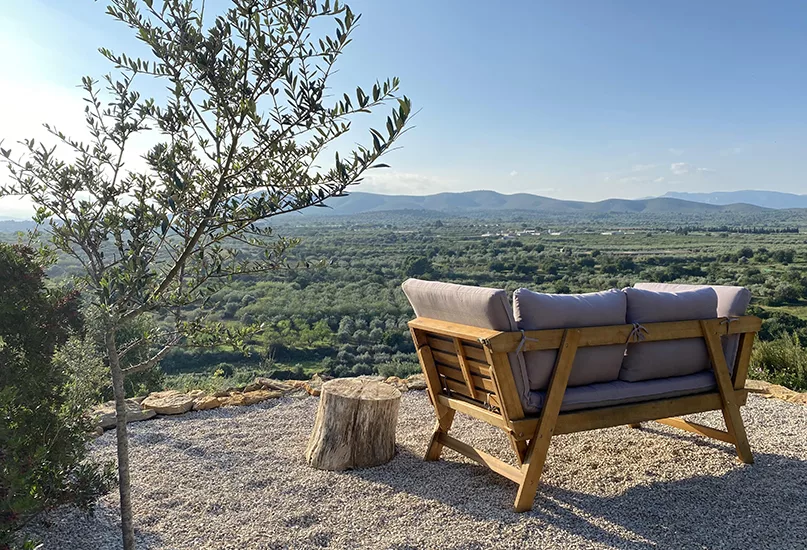
ECO-FRIENDLY ETHOS
Recently, Casa de Olivos has been accepted into Castellon Cycling, an initiative aimed at encouraging cyclists to the province.
“The roads are quiet here, thanks to the low population. Similarly, we have hundreds of kilometres (km) of mountain bike trails through mixed terrain to suit all abilities, and we’ll be focusing on attracting walkers and cyclists next year to discover Castellon as a biking destination,” Deane reveals.
The costs are kept low to make the experiences more affordable and are payable directly to the supplier, so all proceeds go directly to the local businesses.
Casa de Olivos aims to attract more guests outside of the summer months as the climate is still agreeable. There is plenty of appeal for later in the season; the olive harvest is in full swing in November and December, and some of the most raucous festivals are held at a cooler time of year.
“We see the region as a year-round destination and are busy trying to communicate that through our proposition and marketing. Spain is not somewhere to flock to only in the summer holidays, but an amazing and varied country to visit any time of year,” Deane reveals.
“We are continuing to open up more land for our guests to roam and enjoy and have some lovely bench terraces which are typical to the landscape here. By removing some of the most invasive scrubs, we’ve created space for a more diverse natural flora to flourish,” Bretten continues.
“Our mission for guests is wrapped up in our “escape, enjoy, be kind” philosophy, which firmly focuses on a positive experience while underscoring the sustainability ethic”Claire Bretten, co-Founder, Casa de Olivos
Claire Bretten, co-Founder, Casa de Olivos
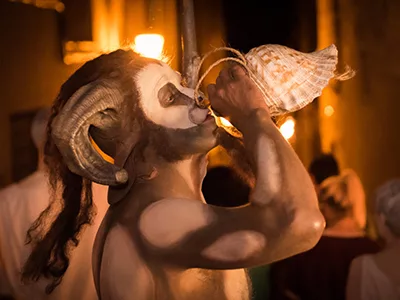
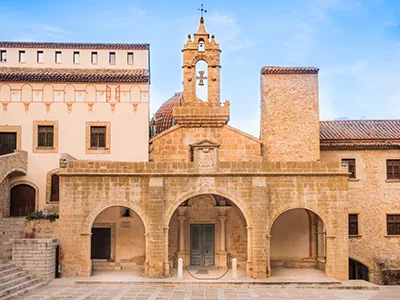
WHAT’S IN STORE FOR 2024
After achieving the Silver award with Green Tourism and a B grade with BioScore this year, Bretten and Deane would like to work towards improving Casa de Olivos’ grading.
Partnering with UK-based company Green Tourism was essential to Casa de Olivos’ journey towards sustainability with 70 indicators grouped under 15 goals. BioScore, meanwhile, is a Valencia-based agency working with tourist accommodation establishments worldwide to certify their sustainability, encompassing over 250 environmental, social, and governance issues.
“The sustainability journey is continuous,” explains Deane. “We have recognition at the provincial level already, having pushed the Casa Rural grading system hard during our registration. We like to think that Casa de Olivos has already gone some way to challenging the old norms, behaviours, and expectations, and represents a template of what is genuinely sustainable.”
In autumn 2024, Casa de Olivos expects to be tree planting on-site, using native species that complement the wider landscape, whilst providing a greater foothold for enhanced biodiversity.
“Beyond our local community of Traiguera, we are net zero citizens with the Tree Nation foundation, who manage tree planting projects all over the world,” reveals Bretten.
As owners and managers, Bretten and Deane have taken steps to inform, educate, and support themselves and their guests to achieve sustainable outcomes.
“We plan to develop passive education during our guests’ stay to inspire them towards reducing waste and recycling,” Deane emphasises.
There are also plans to signpost more information in the outdoor and wild spaces to inform visitors about biodiversity, native species, and natural heritage.
“Our relationship to the town of Traiguera and the local region has been enriched and deepened specifically because of the work we’ve been doing on sustainability,” Bretten informs us.
Due to Casa de Olivos’ ethics, Bretten and Deane have some lovely local friendships, and guests have better access to the experiences and facilities nearby.
“We have policies on diversity and inclusion, and that has led us to see our accommodation through the lens of those with mobility or cognitive challenges and work to make Casa de Olivos as accessible as possible,” Deane informs us.
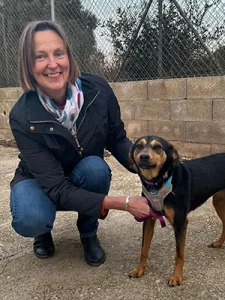
“We plan to develop passive education during our guests’ stay to inspire them towards reducing waste and recycling” Ed Deane, co-Founder, Casa de Olivos
Ed Deane, co-Founder, Casa de Olivos
FOOTPRINT ACCOUNTABILITY
Sustainable accommodation for Casa de Olivos means being off-grid with no connections by wire or pipe to any external services.
“This year, we harnessed around 7,000 kilowatt hours (kWh) from the sun alone, avoiding over 1.6 tonnes of CO2. Our backup generator accounts for less than 0.3 percent of our energy production, although there are plans to minimise that,” details Deane.
For guests, off-grid means no perceptible difference from being on-grid – they are not restricted in their use of electricity or water.
“Although we are generating over 99 percent of our electricity on-site from solar rays, we have to deal with the use of liquid propane gas (LPG) as a fuel source for hot water and room heating, but we are offsetting usage through the Terra Life scheme and investigating options for reducing and eventually eliminating our use of LPG,” reassures Bretten.
Environmentally, the business generates over 99 percent of its electricity from on-site solar arrays. It also monitors and manages its water consumption, relying heavily on collected rainwater as a primary source.
“We have eliminated plastic water bottles from the site as our own water is potable and delicious. We have pushed back on the government’s presumption that air conditioning is necessary. We have demonstrated that our modern build, combined with passive measures, maintains a comfortable living temperature throughout the summer,” details Deane.
While Bretten and Deane don’t evangelise Casa de Olivos’ sustainable principles, they want people to know what it was founded on.
“Our mission for guests is wrapped up in our “escape, enjoy, be kind” philosophy, which firmly focuses on a positive experience while underscoring the sustainability ethic,” Bretten concludes.
There is a plethora of information to help people make sustainable choices to inform them about the work that Casa de Olivos has done, which might inspire them on their own journey towards sustainable living.
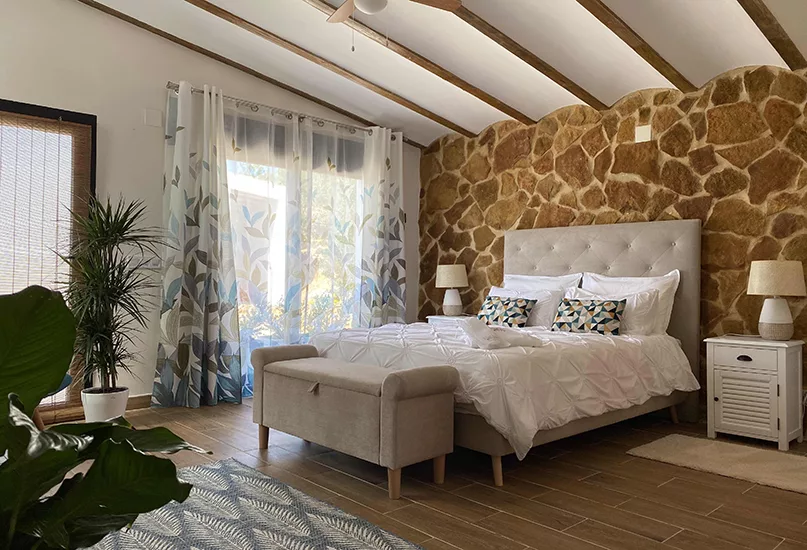
ACCOMMODATION AND FACILITIES
- One-bedroom apartment overlooking the pool terrace.
- Two-bedroom apartment overlooking the gardens and groves.
- Outdoor kitchen and BBQ.
- Sunbathing pods, each with a different vibe, including a four-poster bed, beanbags, and sun loungers, are separated from the pool area by planting, allowing for quiet time, reading, or snoozing.
- Each apartment has yoga mats and an available local massage therapist who offers a relaxing one-hour full-body or intense sports massage.
- Two working olive groves with seating areas amongst the trees.
- Petanca court, where groups can play a very traditional game of boules or pétanque with stunning views across the valley to hills and mountains.
- The co-founders will impart their local knowledge of where to go and what to eat. They live on the premises so that every guest can enjoy a warm welcome, providing a personal touch while giving space and privacy.
- Plans to install electric vehicle (EV) charging points at Casa de Olivos while encouraging Traiguera to install EV chargers in town.


